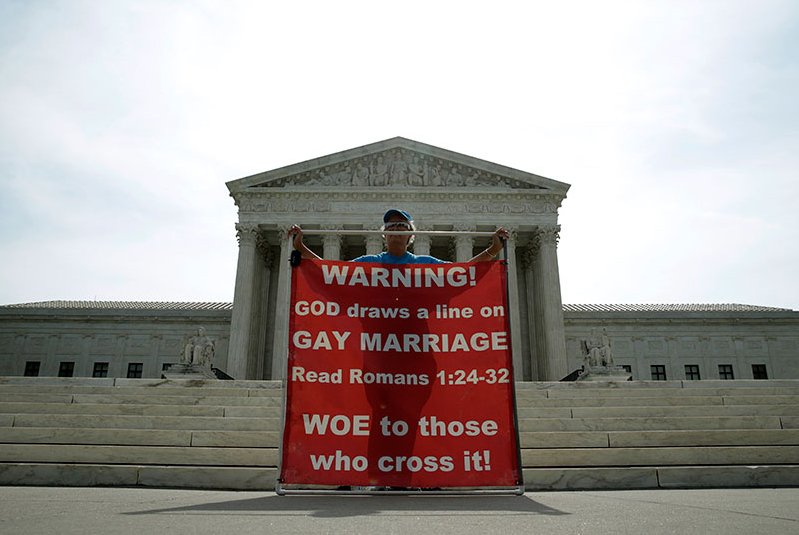
Pew Research Center has released the results of a new survey that asked Americans on how they viewed the topic of homosexuality. Although it indicated record levels of support by the American people, there are still pockets of society that refuse to acknowledge same-sex marriage.
The survey results, which were posted on Monday, asked whether homosexuality should be accepted or discouraged by society. The question was asked in the backdrop of a decision by the Supreme Court on same-sex marriage, which will be made public soon.
"A 57 percent majority of Americans now favor allowing same-sex marriage and 39 percent oppose," Pew wrote. "As recently as five years ago, more opposed (48 percent) same-sex marriage than supported it (42 percent)."
Based on the results, Pew noticed that there are some groups that remain broadly opposed to gay marriage. When it came to party affiliation, Democrats were more likely to support same-sex marriage as opposed to Republicans.
"Today, 65 percent of Democrats and an identical percentage of independents favor gay marriage," Pew wrote. "Only about one third (34 percent) of Republicans do so. Growing shares of all three groups support same-sex marriage, yet the differences between Democrats and Republicans are as wide today as they were a decade ago."
However, Pew noted that Republicans were just as likely as Democrats and Independents to state that it was "inevitable" for same-sex marriage to gain legal recognition. The researchers then looked at the acceptance rate of same-sex marriage by demographics.
"African Americans have become more supportive of same-sex marriage over the last decade," Pew wrote. "However, overall views are mixed: 51 percent of blacks oppose gays and lesbians marrying legally, while 41 percent are in favor. Majorities of whites (59 percent) and Hispanics (56 percent) now favor same-sex marriage."
Pew observed that the racial differences largely persisted even after other factors were taken into account, such as age, religious affiliation and church attendance. The organization then broke down those views by age group.
"Nearly three-quarters of Millennials (73 percent) currently favor legal recognition, with fully 45 percent saying they strongly favor it," Pew wrote. "A more modest majority (59 percent) of Gen Xers (ages 35-50) also support same-sex marriage, while opinions among Baby Boomers (ages 51-69) are divided (45 percent favor, 48 percent oppose); among those in the Silent Generation (ages 70-87), just 39 percent favor same-sex marriage, while 53 percent oppose."
The organization also broke down the survey based on religion. It looked at the sentiment that "homosexuality is in conflict with one's religious beliefs."
"White evangelical Protestants stand out for their deep opposition to same-sex marriage: Just 27 percent favor allowing gays and lesbians to marry, while 70 percent oppose it (43 percent strongly oppose)," Pew wrote. "By contrast, majorities of both Catholics (56 percent) and white mainline Protestants (62 percent) support same-sex marriage, along with an overwhelming majority (85 percent) of the religiously unaffiliated."
Pew pointed out that one-third of Americans felt conflicted between their religious beliefs and homosexuality. Among that group, opposition to same-sex marriage outweighed support 70 percent to 27 percent.
"Fully 76 percent of those who see no such conflict favor allowing gays and lesbians to marry legally," Pew wrote.
However, Pew acknowledged "the view that homosexuality and one's personal religious beliefs are in conflict remains a powerful factor in opposition to same-sex marriage."







